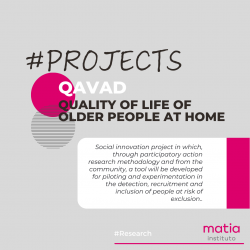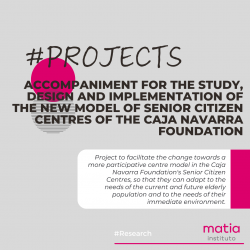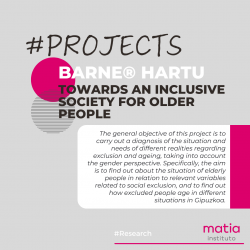QAVAD is a European Erasmus + project that, from the binomial accompaniment/care and training, seeks to promote the development or maintenance of cognitive, motor and social skills, essential for the quality of life of those people who require support and wish to remain in their homes.
Projects
Research
The Matia Gerontological Institute is the unit of Matia Fundazioa dedicated to creating applicable knowledge and its dissemination in society (R+D+i). A unique centre in the Basque Country, with 10 years of experience.
The objective of this Institute is to collaborate in the definition of new models of prevention, care and health, as well as in providing support during the changes associated with ageing and the development of business projects that add value and quality to ageing, creating new solutions based on the knowledge of each of the members of the foundation.

The main objective of the project is to research, develop and study the application of virtual reality solutions aimed at generating well-being in the elderly.
The EXTENSOR project addresses a relevant problem, musculoskeletal disorders are the first cause of sick leave and represent 45.8% of the cost of occupational diseases in the Basque Country.

Matia Instituto collaborates with Fundación Caja Navarra to facilitate the change towards a more participative model of Senior Citizen Centres.
Matia Fundazioa accompanies Getafe City Council in the construction of its First Friendliness Plan within the strategy of an Age-Friendly City.

The EDEN project was born from the interest of having a common European approach to one of the social challenges on the horizon, such as the growing number of people with dementia in the region.
The need to unify the training of future professionals and the demands of the market in relation to this new way of understanding care for people (PCC) is now becoming apparent.
From a functional point of view, frailty is a state of high vulnerability in which the ability of frail elderly people to adapt to adverse events such as a fall or the flu is reduced, leading to functional deterioration and dependence.
